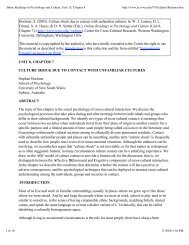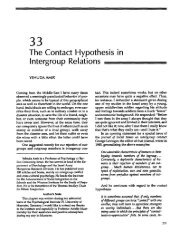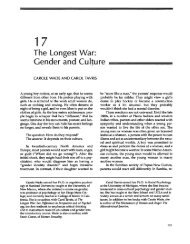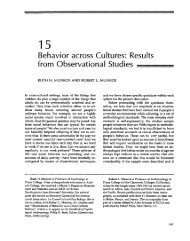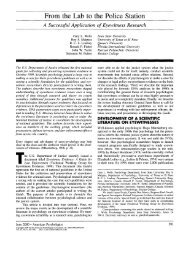Malpass - Eyewitness Identification Lab
Malpass - Eyewitness Identification Lab
Malpass - Eyewitness Identification Lab
Create successful ePaper yourself
Turn your PDF publications into a flip-book with our unique Google optimized e-Paper software.
4 Psychology and Law, Overview<br />
ENCYCLOPEDIA OF APPLIED PSYCHOLOGY - APSY 00380<br />
p0080<br />
s0020<br />
p0085<br />
unpopular and controversial, as they, too, are often<br />
thought to permit culpable offenders to circumvent<br />
punishment for their transgressions. Expert assessment<br />
and expert testimony is common in these cases to<br />
explain how varied mental or neurological conditions<br />
may produce situations in which the conduct of the<br />
accused is unintended, e.g., because it was involuntary,<br />
perhaps a form of automatism, caused by events such<br />
as a head injury or a condition such as sleepwalking,<br />
hypoglycemia, epilepsy, consumption of alcohol or<br />
drugs, or dissociation. Certain mental conditions or<br />
disabilities may exonerate a defendant from criminal<br />
responsibility if the offender lacks the capacity to form<br />
the necessary criminal intent, e.g., defenses that the<br />
offender was suffering from battered woman syndrome,<br />
post-partum depression, sexual addiction,<br />
urban survival syndrome, false memory syndrome,<br />
post-traumatic stress syndrome, multiple personality<br />
disorder, or schizophrenia.<br />
3.1. Legal Competency<br />
The article on legal competency by Poythress delineates<br />
the types of decision-making abilities or competencies<br />
at discrete moments in the civil and criminal<br />
legal process about which courts most frequently seek<br />
advice from psychologists trained in forensic assessment<br />
and evaluation. The accompanying tables and<br />
charts succinctly illustrate the legal standards or issues<br />
in the cases and the related psychological competencies<br />
that bear on them. Three elements that must be<br />
addressed by a forensic psychologist in each case involving<br />
an assessment of fitness or competency are (1) the<br />
presence of a mental condition that causes an impairment,<br />
(2) specifications of the functional impairment,<br />
and (3) the distinct legal abilities key to the case that<br />
are affected.<br />
The article begins by orienting practitioners to the<br />
context of the task by outlining a framework within the<br />
law that psychologists are well advised to understand<br />
in order to offer more helpful information to the<br />
courts. A helpful conceptual tool for practitioners and<br />
psycholegal researchers is a table listing the five aspects<br />
of legal competencies identified by Grisso (2001), as it<br />
sets forth those aspects of the task most clearly within<br />
the province of the forensic psychologist, and those<br />
aspects most clearly within the province of the fact<br />
finder (judge or jury). In particular, it is important to<br />
note that the legal standards or tests for fitness vary<br />
from one circumstance to the next. Accordingly, the<br />
psychologist must appropriately tailor the information<br />
critical to the fact finders in applying the legal standard<br />
that applies in a given case. Many of the competence<br />
tests and standards pertinent to civil cases have<br />
received less research attention than those pertinent<br />
in criminal cases, i.e., criteria relevant to determinations<br />
of fitness to make decisions about guardianship,<br />
treatment, research participation, and testamentary<br />
capacity.<br />
A point of significance is the limited utility of a<br />
diagnosis in many legal proceedings. Although the<br />
goal or end point of many clinical mental health<br />
inquiries is a diagnosis, legally, the diagnosis itself is<br />
of little value to a court charged with determining<br />
whether someone meets the criteria for a defense of<br />
insanity or otherwise lacks fitness to proceed to trial.<br />
The fact finder seeks a functional description or<br />
understanding of the nature and scope of an individual’s<br />
impairment from the consulting expert. A diagnosis<br />
by a mental health professional of a mentally<br />
disabling condition or disorder does not guarantee<br />
that the applicable legal test will be met, but the diagnosis<br />
may be of some relevance. Severe mental disturbance<br />
or lack of a diagnosis neither guarantees nor is<br />
fatal to a claim of incompetence or insanity.<br />
The terms insanity and incompetence are legal, not<br />
psychological, concepts. The legal test for insanity<br />
varies from one jurisdiction or community to another,<br />
although most tests incorporate the offender’s cognitive<br />
awareness of the consequences of the conduct at<br />
issue. Tests that address some of the ‘‘irresistible<br />
impulse’’ standards have in some cases devolved into<br />
a question as to whether the accused would engage in<br />
the same conduct were there a policeman present. In<br />
some states or countries, the standard of ‘‘guilty but<br />
mentally ill’’ has been adopted as a variant of ‘‘not<br />
guilty by reason of insanity.’’ In other communities,<br />
legal policy reforms have established that voluntary<br />
conduct that produces diminished capacities, such as<br />
drinking alcohol or taking drugs, obviates resort to this<br />
defense. Policies along these lines conform with the<br />
results of studies of juror decision making in insanity<br />
cases, which revealed that jurors often take into account<br />
the offender’s capacity to make responsible<br />
choices and whether the offender was negligent or<br />
reckless in bringing about his or her mental disability.<br />
In his article, Poythress adroitly sets controversial<br />
topics such as the insanity defense in context by pointing<br />
out the infrequency of its use and its low success<br />
rate. He also emphasizes the importance of and demand<br />
for many other fitness determinations by psychologists,<br />
such as fitness to stand trial, or when the<br />
ELSEVIER PROOF<br />
p0090<br />
p0095<br />
p0100



